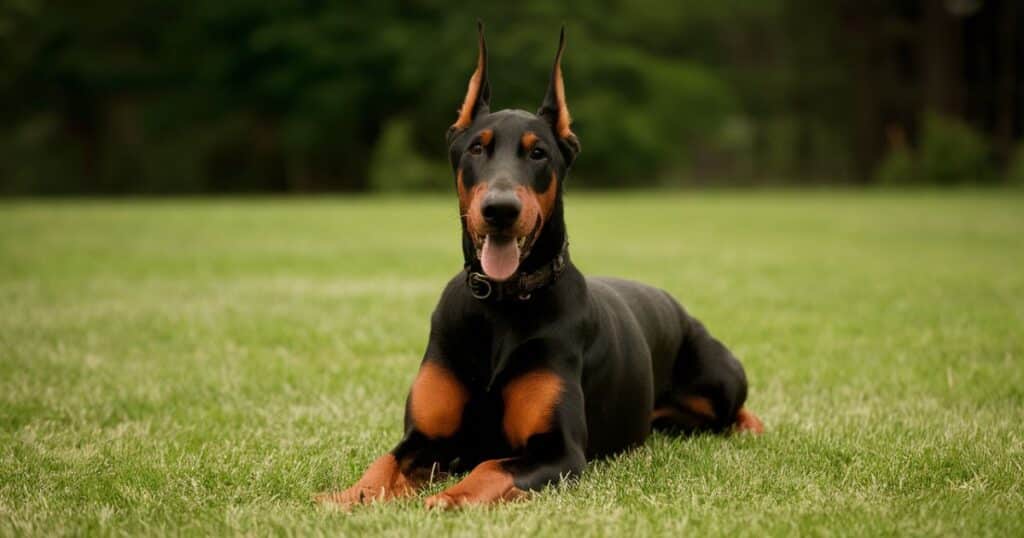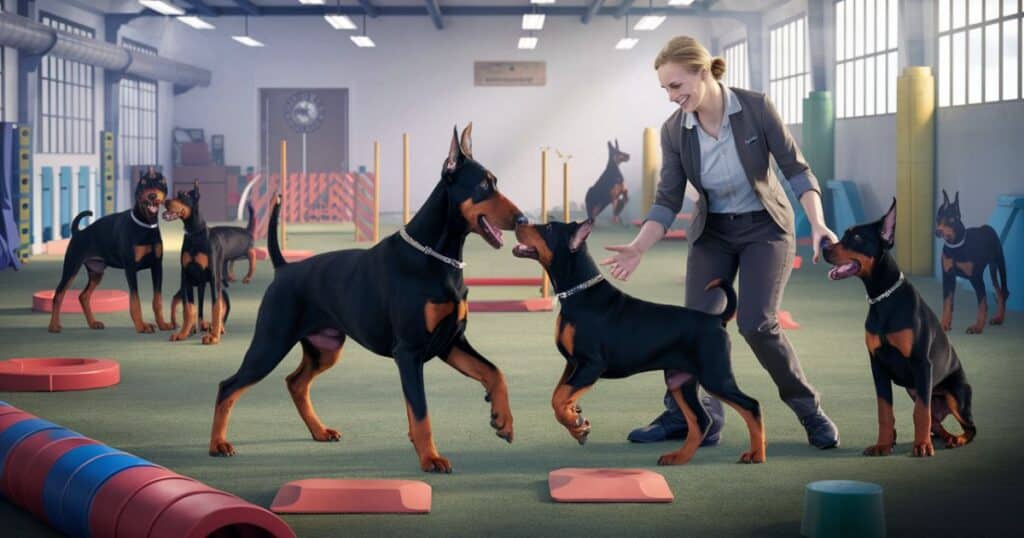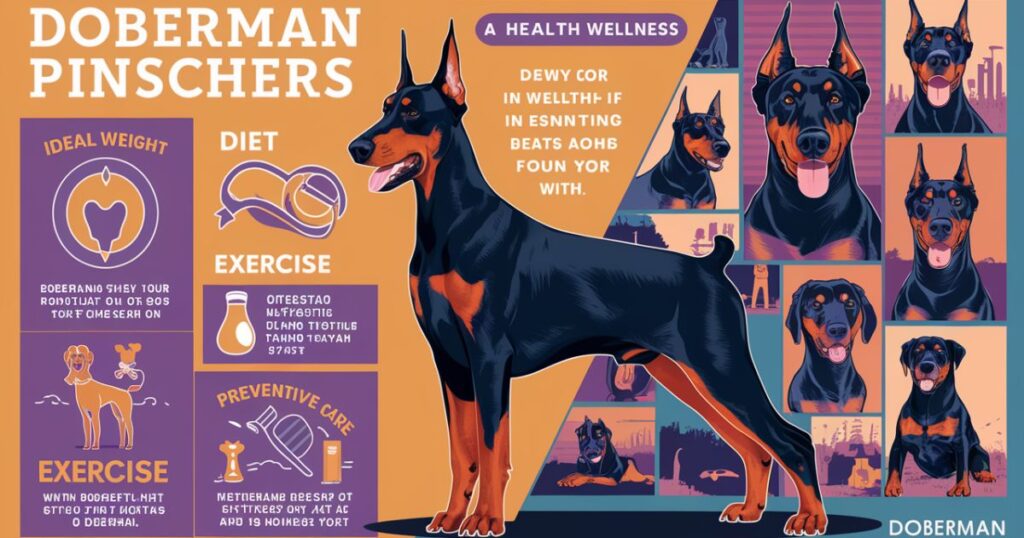Doberman Pinschers, often referred to as Dobermans, are a breed known for their intelligence, loyalty, and athletic build. With a rich history dating back to the late 19th century, these dogs have captured the hearts of many dog enthusiasts worldwide. In this comprehensive guide, we’ll delve into every aspect of owning and caring for a Doberman Pinscher, from their unique characteristics and health considerations to their training needs and socialization requirements.
Introduction
Brief Overview of Doberman Pinschers
The Doberman Pinscher is a medium-to-large breed originally developed in Germany. Known for their sleek and muscular appearance, Dobermans are often associated with their roles as guard dogs, police dogs, and loyal companions. However, these remarkable canines are much more than just their tough exterior; they are highly intelligent, trainable, and make excellent family pets when properly socialized and trained.
Importance of Understanding Doberman’s Characteristics
Before bringing a Doberman Pinscher into your life, it’s crucial to understand their unique characteristics, temperament, and specific needs. This breed requires a knowledgeable and committed owner who can provide the necessary training, exercise, and socialization to ensure a well-rounded and well-behaved companion.
Purpose of the Article
This ultimate guide aims to provide prospective and current Doberman owners with comprehensive information about the breed, covering topics such as their history, care, characteristics, potential health problems, diet, training needs, and more. By arming you with this knowledge, you’ll be better equipped to make an informed decision about whether a Doberman Pinscher is the right fit for your lifestyle and to provide the best possible care for your furry friend.
History and Origin
The Origins of the Doberman Pinscher Breed

The Doberman Pinscher breed was developed in the late 19th century by a German tax collector named Louis Dobermann. Dobermann sought to create a breed that would excel as a guard dog, personal protection companion, and an efficient companion for his tax collection duties. He achieved this by selectively breeding various dog breeds, including the German Pinscher, Rottweiler, and Black and Tan Terrier.
ALSO READ: Long-Haired (Fluffy) Labradors: A Comprehensive Guide To Facts, Origin And History In 2024
Historical Roles and Jobs of Dobermans
Throughout their history, Doberman Pinschers have been employed in various roles, including:
- Guard dogs: Their loyalty, intelligence, and protective nature made them excellent guard dogs for homes, businesses, and military installations.
- Police and military dogs: Dobermans’ trainability and courage made them valuable assets for law enforcement and military operations, where they served as patrol dogs, detection dogs, and personal protection dogs.
- Therapy dogs: With proper socialization and training, Dobermans have proven to be excellent therapy dogs, providing comfort and emotional support to individuals in need.
Key Influencers in the Breed’s Development
While Louis Dobermann is credited as the breed’s founder, several other individuals played crucial roles in refining and promoting the Doberman Pinscher. One such notable figure was Otto Goeller, a German breeder who is widely regarded as the “grandfather” of the modern Doberman Pinscher. Goeller’s selective breeding practices and adherence to strict standards helped establish the breed’s iconic appearance and temperament.
Breed Characteristics of Doberman Pinschers
Physical Appearance of Dobermans
Doberman Pinschers are known for their striking and muscular appearance. Here are some of their distinctive physical traits:
- Size: Male Dobermans typically stand between 26 and 28 inches tall at the shoulder, while females are slightly smaller, ranging from 24 to 26 inches.
- Weight: The ideal weight for a male Doberman is between 75 and 100 pounds, while females generally weigh between 60 and 90 pounds.
- Coat: Dobermans have a short, sleek, and smooth coat that comes in four colors: black, red, blue, and fawn (Isabella).
- Head: They have a long, wedge-shaped head with a tapered muzzle and pointed ears that can be cropped or left natural.
- Body: Dobermans have a muscular and athletic build, with a deep chest, tuck-up abdomen, and well-developed hindquarters.
Doberman Temperament and Personality Traits
While Dobermans may have an intimidating appearance, they are known for their loyalty, intelligence, and affectionate nature when properly socialized and trained. Here are some of their key temperament traits:
- Loyal: Dobermans are incredibly loyal and devoted to their owners, making them excellent companions and protectors.
- Intelligent: With their high intelligence, Dobermans are quick learners and excel in various training activities, from obedience to agility and even search and rescue tasks.
- Confident and Alert: Dobermans are highly confident and alert, which makes them excellent watchdogs. However, this trait also means they require proper socialization and training to prevent excessive barking or territorial behavior.
- Affectionate: Despite their imposing appearance, Dobermans are known to be affectionate and loving with their families, especially when introduced to a positive environment from an early age.
- Energetic: Dobermans are high-energy dogs that require regular exercise and mental stimulation to prevent boredom and destructive behaviors.
Health Considerations for Doberman Pinschers
Like all breeds, Doberman Pinschers are prone to certain health issues, including:
- Dilated Cardiomyopathy (DCM): This is a hereditary heart condition that can lead to heart failure if left undetected and untreated.
- Von Willebrand’s Disease (vWD): A genetic bleeding disorder that can cause excessive bleeding and bruising.
- Cervical Vertebral Instability (Wobbler Syndrome): A condition affecting the vertebrae in the neck, which can lead to neurological issues and paralysis if left untreated.
- Hip and Elbow Dysplasia: Inherited conditions that can cause lameness and arthritis in the joints.
It’s essential to work with reputable breeders who perform necessary health screenings and follow ethical breeding practices to minimize the risk of these conditions. Regular veterinary check-ups and preventive care are also crucial for maintaining your Doberman’s overall health and well-being.
Owning a Doberman Pinscher
Is a Doberman Right for You?
Before committing to owning a Doberman Pinscher, it’s essential to consider whether this breed aligns with your lifestyle, living situation, and commitment level. Here are some key factors to consider:
- Activity Level: Dobermans are highly energetic and require a significant amount of daily exercise and mental stimulation. They thrive best in homes with active owners who can provide plenty of physical and mental challenges.
- Living Situation: While Dobermans can adapt to apartment living, they do best in homes with access to a yard or nearby parks for running and playing.
- Family Dynamics: Dobermans can make excellent family pets when properly socialized from an early age. However, they may not be the best choice for households with very young children due to their size and energy level.
- Time Commitment: Dobermans require a significant time commitment for training, exercise, and socialization. They do not fare well when left alone for extended periods and may develop separation anxiety or destructive behaviors.
- Experience Level: While Dobermans are highly intelligent and trainable, they can be strong-willed and may not be the best choice for first-time dog owners or those with limited experience with large, energetic breeds.
Finding a Reputable Breeder or Rescue Organization
If you’ve decided that a Doberman Pinscher is the right fit for you, it’s crucial to find a reputable source for your new furry companion. Here are some tips:
- Responsible Breeders: Look for breeders who prioritize health, temperament, and ethical breeding practices. They should provide health certifications for the parents, socialize their puppies properly, and be willing to answer all your questions.
- Rescue Organizations: Doberman rescues are another excellent option for finding a well-socialized and vetted Doberman in need of a loving home.
Puppy vs. Adult Doberman: Pros and Cons
When considering a Doberman Pinscher, you’ll need to decide whether to go with a puppy or an adult dog. Both options have their pros and cons:
Puppies:
- Pros: You can shape their early socialization and training from the start, creating a strong bond. It’s easier to mold a puppy’s behavior and habits.
- Cons: Puppies require more time, patience, and consistency for training and housebreaking. There’s also more financial commitment for supplies, vaccinations, and training classes.
Adult Dobermans:
- Pros: Adults often have basic training and are past the destructive puppy stage. Their temperament is established, making it easier to assess if they’re a good fit.
- Cons: You may need to work on breaking bad habits or overcoming prior negative experiences. Bonding can take more time compared to raising a puppy.
Preparing Your Home for a Doberman
To ensure a smooth transition and a safe environment for your new Doberman companion, it’s essential to prepare your home properly. Here are some tips:
- Exercise Area: Designate a secure outdoor space or fenced yard for exercise and playtime.
- Indoor Space: Dobermans need ample indoor space to move around comfortably. Baby gates or crate training can help manage their access to certain areas.
- Chew-Proof: Provide plenty of durable chew toys and remove or secure any items that could be potential choking hazards or chewing temptations.
- Grooming Supplies: Invest in basic grooming supplies like a slicker brush, nail clippers, and high-quality dog shampoo.
- Training Aids: Have treats, toys, and training aids on hand to facilitate positive reinforcement training.
Training and Socialization for Dobermans

Early Socialization and Its Importance for Dobermans
Early socialization is crucial for Doberman Pinschers to develop well-rounded personalities and prevent fear-based or aggressive behaviors. Exposing your Doberman puppy to various sights, sounds, people, and environments in a positive and controlled manner can help them become confident and well-adjusted adult dogs.
Basic Obedience Training for Doberman Pinschers
Dobermans are highly intelligent and thrive on mental stimulation, making them excellent candidates for obedience training. Basic commands like sit, stay, come, heel, and leave it should be introduced early and reinforced consistently. Positive reinforcement techniques, such as reward-based training, are recommended for Dobermans as they respond well to praise, treats, and toys.
Advanced Training and Activities for Dobermans
Beyond basic obedience, Dobermans excel in various advanced training activities and sports, including:
- Agility: Dobermans’ athletic abilities make them well-suited for agility competitions, where they navigate obstacle courses with precision and speed.
- Tracking and Scent Work: Their keen sense of smell and focus make Dobermans excellent candidates for tracking and scent work activities.
- Protection and Guard Work: With proper training from experienced professionals, Dobermans can excel in personal protection and guard dog roles.
- Therapy Work: Dobermans with the right temperament can become certified therapy dogs, providing emotional support and comfort to those in need.
Common Training Challenges and Solutions for Doberman Owners
While Dobermans are highly trainable, they can present some challenges that owners should be prepared to address:
- Stubbornness: Dobermans can be strong-willed and may test boundaries. Consistency, positive reinforcement, and firm yet fair handling are essential.
- Dominance: Early socialization and establishing a clear leader-follower dynamic can prevent dominance issues.
- Excessive Barking: Teaching the “quiet” command and providing ample exercise and mental stimulation can help curb excessive barking.
- Separation Anxiety: Gradually desensitizing your Doberman to being alone and providing appropriate outlets for their energy can mitigate separation anxiety.
Exercise and Activity Needs of Doberman Pinschers
Daily Exercise Requirements for Dobermans
Doberman Pinschers are high-energy dogs that require a significant amount of daily exercise to maintain their physical and mental well-being. Here are some general exercise guidelines:
- Daily Walks: At a minimum, Dobermans should receive two brisk walks of 30-60 minutes each day.
- Running and Hiking: Jogging, hiking, or participating in dog sports like agility or flyball are excellent ways to provide additional exercise.
- Playtime: Interactive play sessions, such as fetch or tug-of-war, can help burn off excess energy and provide mental stimulation.
Mental Stimulation for Intelligent Doberman Pinschers
In addition to physical exercise, Dobermans require mental stimulation to prevent boredom and destructive behaviors. Here are some ways to keep their minds engaged:
- Puzzle Toys and Treat Dispensers: These interactive toys encourage problem-solving skills and provide a rewarding challenge for your Doberman.
- Nose Work and Tracking: Engaging your Doberman’s natural scenting abilities through nose work or tracking games can be incredibly mentally stimulating.
- Training Sessions: Incorporate new tricks, obedience commands, or advanced training exercises into your routine to keep your Doberman’s mind sharp.
- Rotating Toys: Regularly rotate your Doberman’s toys to prevent boredom and maintain their interest.
Outdoor Activities and Games for Dobermans
Dobermans thrive on outdoor activities and interactive games that challenge their physical and mental capabilities. Here are some options to consider:
- Hiking and Trail Running: Dobermans make excellent hiking and trail running companions, allowing them to explore new environments while getting ample exercise.
- Dock Diving and Swimming: Many Dobermans enjoy water activities like dock diving or swimming, which can provide a full-body workout and mental stimulation.
- Flyball and Agility: These fast-paced dog sports challenge your Doberman’s agility, speed, and focus while providing a fun and engaging activity.
- Frisbee and Fetch: Classic games like fetch and frisbee can be excellent ways to bond with your Doberman while providing physical and mental exercise.
Tips for Preventing Boredom in Doberman Pinschers
Dobermans are intelligent and energetic dogs that can quickly become bored without proper stimulation. Boredom can lead to destructive behaviors, excessive barking, or other unwanted habits. To prevent boredom, consider the following tips:
- Rotate Toys and Activities: Regularly introduce new toys, puzzles, and activities to keep your Doberman engaged and interested.
- Provide Enrichment: Offer food-dispensing toys, puzzle feeders, or hide treats around the house to encourage foraging and problem-solving behaviors.
- Doggie Daycare or Dog Walker: If you’re away from home for extended periods, consider enrolling your Doberman in a reputable doggie daycare or hiring a professional dog walker.
- Mental Exercise: Incorporate training sessions, nose work, or other mentally stimulating activities into your Doberman’s routine.
- Adequate Exercise: Ensure your Doberman receives sufficient daily exercise to burn off excess energy and prevent pent-up frustration.
Grooming and Care for Doberman Pinschers
Doberman Coat Care and Grooming Tips
Dobermans have a short, sleek coat that is relatively low-maintenance in terms of grooming. However, regular brushing is still essential to remove loose hair and distribute natural oils throughout their coat. Here are some grooming tips:
- Brushing: Use a slicker brush or grooming mitt to brush your Doberman once or twice a week, paying extra attention to areas prone to matting, such as behind the ears and the legs.
- Bathing: Dobermans typically only need bathing when they become noticeably dirty or develop an odor. Use a mild, dog-safe shampoo and rinse thoroughly.
- Nail Trimming: Trim your Doberman’s nails every 4-6 weeks to prevent overgrowth and potential discomfort or injury.
- Ear Cleaning: Check and clean your Doberman’s ears regularly to prevent wax buildup and potential infections.
Regular Health Check-ups for Dobermans
Regular veterinary check-ups are crucial for monitoring your Doberman’s health and catching any potential issues early. Here’s what you can expect during these visits:
- Physical Examination: Your veterinarian will perform a thorough physical examination, checking your Doberman’s weight, body condition, and overall health.
- Vaccinations: Your veterinarian will ensure your Doberman’s vaccinations are up-to-date and recommend any additional boosters or preventative medications as needed.
- Diagnostic Tests: Depending on your Doberman’s age and health status, your veterinarian may recommend diagnostic tests such as blood work, urinalysis, or imaging to detect any underlying health issues.
- Grooming and Parasite Control: Your veterinarian may also provide recommendations for grooming, flea and tick control, and other preventative measures.
Feeding and Nutrition for Doberman Pinschers
Appropriate Diet for Doberman Pinschers
Providing a balanced and nutritious diet is essential for your Doberman’s overall health, energy levels, and longevity. Here are some guidelines for feeding your Doberman:
- High-Quality Dog Food: Look for a high-quality, protein-rich dog food formulated for large breeds or active dogs. Avoid cheap, low-quality foods with fillers and artificial preservatives.
- Portion Control: Follow the recommended feeding guidelines on the dog food package, taking into account your Doberman’s age, activity level, and any potential weight issues.
- Variety: Consider rotating between different protein sources and brands to provide a variety of nutrients and prevent food sensitivities or allergies.
- Supplements: Discuss the need for any supplements, such as glucosamine for joint health or omega-3 fatty acids for skin and coat health, with your veterinarian.
Feeding Schedules for Dobermans
Establishing a consistent feeding schedule is essential for your Doberman’s digestive health and overall well-being. Here are some general guidelines:
- Puppies (up to 6 months): Feed three to four smaller meals per day to support their rapid growth and development.
- Adults (6 months to 1 year): Transition to two meals per day, splitting their daily caloric intake into equal portions.
- Adults (1 year and older): Most adult Dobermans do well with two meals per day, spaced out evenly throughout the day.
Remember to adjust portion sizes based on your Doberman’s age, activity level, and any specific dietary requirements recommended by your veterinarian.
Special Dietary Considerations for Doberman Breeds
While a high-quality, well-balanced diet is essential for all dogs, Dobermans may have some specific dietary considerations:
- Large Breed Puppy Formula: Look for a large breed puppy formula to support proper growth and development, as regular puppy food may cause them to grow too quickly, leading to potential joint and skeletal issues.
- Weight Management: Dobermans can be prone to obesity, so portion control and regular exercise are crucial. Your veterinarian may recommend a weight management formula for overweight or inactive Dobermans.
- Sensitive Stomach: Some Dobermans may have sensitive stomachs or food allergies, in which case a limited-ingredient or hypoallergenic diet may be recommended.
Always consult with your veterinarian before making any significant dietary changes for your Doberman to ensure their nutritional needs are being met.
Health and Wellness of Doberman Pinschers

Common Health Issues in Doberman Pinschers
While Dobermans are generally healthy dogs, they are prone to certain hereditary and breed-specific health issues. Being aware of these conditions can help you take proactive measures and seek prompt veterinary care when necessary.
- Dilated Cardiomyopathy (DCM): A heart condition that can lead to heart failure if left untreated. Regular heart screening is recommended.
- Cervical Vertebral Instability (Wobbler Syndrome): A neurological condition affecting the vertebrae in the neck that can cause weakness, incoordination, and paralysis.
- Von Willebrand’s Disease (vWD): A genetic bleeding disorder that can cause excessive bleeding and bruising.
- Hip and Elbow Dysplasia: Inherited conditions that can cause joint pain, arthritis, and mobility issues.
- Bloat (Gastric Dilatation-Volvulus): A potentially life-threatening condition where the stomach becomes twisted and distended, cutting off blood flow.
It’s essential to work with reputable breeders who perform necessary health screenings and follow ethical breeding practices to minimize the risk of these conditions.
Vaccinations and Preventive Care for Dobermans
Keeping your Doberman up-to-date on vaccinations and preventative care is crucial for maintaining their overall health and well-being. Here are some essential preventative measures:
- Core Vaccinations: These include vaccines for distemper, parvovirus, adenovirus, and rabies, which are recommended for all dogs.
- Non-Core Vaccinations: Depending on your location and lifestyle, your veterinarian may recommend additional vaccines, such as Bordetella (kennel cough), Leptospirosis, or Lyme disease.
- Flea, Tick, and Heartworm Prevention: Discuss appropriate preventative medications or treatments with your veterinarian to protect your Doberman from these potential threats.
- Dental Care: Regular dental cleanings and at-home tooth brushing can help prevent dental disease and associated health issues.
Recognizing Signs of Illness in Doberman Dogs
Early detection and treatment of illness can significantly improve your Doberman’s prognosis and quality of life. Be vigilant for any signs of distress or changes in behavior, and seek prompt veterinary attention if you notice any of the following:
- Loss of appetite or decreased water intake
- Lethargy or decreased energy levels
- Vomiting or diarrhea
- Coughing, sneezing, or respiratory issues
- Limping or difficulty moving
- Changes in urination or defecation habits
- Unusual lumps, bumps, or skin irritations
- Behavioral changes, such as increased aggression or anxiety
Emergency Preparedness for Doberman Pinscher Owners
As a responsible Doberman owner, it’s essential to be prepared for potential emergencies. Here are some steps you can take:
- First Aid Kit: Assemble a pet first aid kit with essential supplies, such as bandages, antiseptic wipes, scissors, and a pet-safe cold pack.
- Emergency Contacts: Keep a list of emergency veterinary clinics, poison control hotlines, and any other essential contacts readily available.
- Pet Insurance: Consider investing in pet insurance to help cover unexpected veterinary expenses in case of emergencies or illnesses.
- Pet identification: Ensure your Doberman is microchipped and wears a collar with up-to-date identification tags in case they ever get lost.
By being proactive and prepared, you can help ensure the safety and well-being of your beloved Doberman companion.
ALSO READ: White Labrador Retriever Dog Breed: Comprehensive Guide To Facts, Origin & History In 2024
10 Reasons Why Doberman Pinschers Make the Perfect Family Pet
Despite their imposing appearance, Doberman Pinschers can make excellent family companions when properly trained and socialized. Here are 10 reasons why Doberm
Here is the continued section on 10 Reasons Why Doberman Pinschers Make the Perfect Family Pet:
- Intelligent and Trainable: Dobermans are highly intelligent and eager to please, making them very trainable and responsive to positive reinforcement training methods. Their ability to learn quickly and follow commands makes them excellent companions for active families.
- Loyal and Protective: Dobermans are renowned for their unwavering loyalty and protective nature towards their families. They have a natural tendency to guard and defend their loved ones, making them excellent watchdogs and protectors.
- Affectionate and Loving: Contrary to their sometimes intimidating appearance, Dobermans are incredibly affectionate and loving with their families when properly socialized and trained from a young age. They form strong bonds and thrive on companionship and attention.
- Energetic and Active: Dobermans are highly energetic and athletic dogs, making them ideal companions for families who lead active lifestyles and enjoy outdoor activities like hiking, running, or playing at the park.
- Versatile and Adaptable: While Dobermans require ample exercise and mental stimulation, they can adapt well to various living situations, including apartments or smaller homes, as long as their exercise needs are met.
- Good with Children: With proper socialization and training, Dobermans can make excellent companions for children. Their patience, loyalty, and protective nature make them great family dogs, but supervision is still recommended, especially with younger children.
- Obedient and Eager to Please: Dobermans have a strong desire to please their owners, making them highly obedient and responsive to training. Their eagerness to learn and follow commands makes them well-suited for various activities and sports.
- Alertness and Vigilance: Dobermans are naturally alert and vigilant, making them excellent watchdogs. They have a keen awareness of their surroundings and will alert their owners to any potential threats or unusual activities.
- Low-Maintenance Grooming: Despite their sleek and athletic appearance, Dobermans have a short, smooth coat that requires minimal grooming. Regular brushing, occasional bathing, and nail trimming are typically all that’s needed to keep them looking their best.
- Suitable for Experienced Owners: While Dobermans can make wonderful family pets, it’s important to note that they may not be the best choice for first-time dog owners or those unfamiliar with large, energetic breeds. Their size, strength, and exercise requirements make them better suited for experienced owners who can provide proper training, socialization, and exercise.
By providing proper training, socialization, exercise, and care, Doberman Pinschers can be loving, loyal, and devoted companions that bring joy and security to families for years to come.
Is Doberman Ear Cropping Necessary?
One controversial topic surrounding Doberman Pinschers is the practice of ear cropping. Ear cropping is a surgical procedure that involves trimming a Doberman’s floppy ears to create an upright, pointed appearance. While this practice was historically done for practical reasons (to prevent ear injuries during hunting or protection work), it is now primarily cosmetic.
Many animal welfare organizations and veterinary associations have spoken out against ear cropping, as it is an unnecessary and potentially painful procedure for the dog. Additionally, several countries and some U.S. states have banned or restricted the practice.
It’s important to note that ear cropping is not necessary for a Doberman’s health or well-being. Dobermans with natural, uncropped ears are equally capable and can still participate in various activities and sports.
Ultimately, the decision to crop or not crop a Doberman’s ears is a personal choice for the owner. However, it’s essential to research and understand the potential risks, benefits, and ethical considerations before making a decision.
What Are Doberman Pinschers Like with Kids?
Doberman Pinschers can make excellent family companions, including for households with children, when properly trained and socialized from an early age. However, it’s important to note that Dobermans are large, energetic dogs, and supervision is always recommended when they interact with young children.
When raised with children from puppyhood, Dobermans tend to be gentle, patient, and protective with their young family members. Their loyalty and protective nature can make them excellent guardians for children, but their size and strength also necessitate proper training and guidance to ensure everyone’s safety.
It’s essential to teach children how to interact respectfully with Dobermans and to never tease, pull, or roughhouse with the dog. Dobermans can be territorial and may perceive such behaviors as threats, potentially leading to defensive or aggressive reactions.
Additionally, Dobermans require ample exercise and mental stimulation, which can be challenging for families with very young children who may not be able to provide the necessary level of activity. In such cases, it may be better to wait until children are older before introducing a Doberman into the household.
With proper socialization, training, and supervision, Doberman Pinschers can be wonderful companions for families with children, providing love, loyalty, and protection while teaching valuable lessons about responsibility and respect for animals.
Pros and Cons of a Doberman Pinscher
Like any breed, Doberman Pinschers come with their own set of pros and cons that potential owners should carefully consider before bringing one into their home. Here’s a closer look at some of the key advantages and challenges of owning a Doberman:
Pros:
- Loyalty and Protection: Dobermans are renowned for their unwavering loyalty and protective nature, making them excellent watchdogs and guardians.
- Intelligence and Trainability: With their high intelligence and eagerness to learn, Dobermans excel in training and can participate in various activities and sports.
- Energy and Activity Levels: Dobermans have high energy levels and thrive on regular exercise and mental stimulation, making them great companions for active families.
- Affectionate and Loving: When properly socialized, Dobermans are incredibly affectionate and loving with their families, forming strong bonds and thriving on companionship.
- Versatility: Dobermans can adapt to various living situations, from apartments to homes with yards, as long as their exercise and mental stimulation needs are met.
Cons:
- Exercise and Mental Stimulation Requirements: Dobermans require a significant amount of daily exercise and mental stimulation, which can be challenging for some owners to provide consistently.
- Potential for Aggression: Without proper socialization and training, Dobermans can become aggressive, territorial, or overprotective, which can be dangerous around children or other pets.
- Grooming Needs: While their short coat is relatively low-maintenance, Dobermans still require regular brushing, nail trimming, and ear cleaning to maintain their health and appearance.
- Potential Health Issues: Like many purebred dogs, Dobermans are prone to certain hereditary health conditions, such as dilated cardiomyopathy (DCM), cervical vertebral instability (wobbler syndrome), and von Willebrand’s disease (vWD).
- Initial Investment: Acquiring a well-bred Doberman puppy from a reputable breeder can be expensive, and the costs of proper training, socialization, and medical care should also be considered.
Ultimately, Doberman Pinschers can make excellent companions for the right owners – those who can provide the necessary exercise, training, socialization, and overall care to meet the breed’s specific needs. Careful consideration of your lifestyle, experience level, and commitment is crucial before deciding to bring a Doberman into your home.
Quick Facts About Doberman Pinschers
Here are some quick facts and key information about Doberman Pinschers:
- Height: Male Dobermans typically stand 26-28 inches tall at the shoulder; females are slightly smaller at 24-26 inches.
- Weight: The ideal weight range for male Dobermans is 75-100 pounds, while females are 60-90 pounds.
- Lifespan: Dobermans generally have a lifespan of 10-12 years with proper care and a healthy lifestyle.
- Coat Colors: Common coat colors include black, red, blue, and fawn (Isabella).
- Grooming Needs: Dobermans have a short, sleek coat that requires weekly brushing and occasional bathing.
- Exercise Requirements: As a highly active breed, Dobermans require at least 2 hours of exercise per day, including brisk walks, running, hiking, or other high-intensity activities.
- Temperament: Well-socialized Dobermans are loyal, intelligent, confident, and protective of their families. Proper training and socialization are crucial from an early age.
- Trainability: Dobermans are highly intelligent and responsive to training, excelling in obedience, agility, protection work, and various dog sports.
- Common Health Issues: Potential health concerns include dilated cardiomyopathy (DCM), cervical vertebral instability (wobbler syndrome), von Willebrand’s disease (vWD), hip and elbow dysplasia, and bloat.
These quick facts provide an overview of the Doberman Pinscher breed, highlighting their physical characteristics, exercise needs, temperament traits, and potential health considerations. Prospective owners should thoroughly research and understand these aspects to determine if a Doberman is the right fit for their lifestyle and commitment level.
How Appealing is the Concept of a Dog-first Airline to Doberman Owners?
The concept of a dog-first airline, where canine passengers are treated as valued guests and their comfort and safety are prioritized, may hold particular appeal for Doberman Pinscher owners. Here’s why:
- Travel Anxiety: Many Dobermans, like other breeds, can experience travel anxiety or stress when flying, which can potentially lead to behavioral issues or health complications. A dog-friendly airline environment could help alleviate some of these concerns and make travel more comfortable for both the dogs and their owners.
- Size Accommodation: As a large breed, Dobermans may have difficulty fitting comfortably in standard airline carriers or under the seat. A dog-first airline could provide more spacious accommodations, such as designated pet cabins or larger carriers, ensuring their comfort during flights.
- Exercise and Potty Break Facilities: Dobermans have high energy levels and exercise requirements. An airline catering specifically to dogs might offer exercise areas or designated potty break facilities, allowing Dobermans to stretch their legs and relieve themselves during layovers or long flights.
- Trained Staff: Airlines focused on pet travel would likely employ staff trained in handling and caring for dogs, including knowledge of breed-specific needs and behaviors. This could provide peace of mind for Doberman owners, knowing their dogs are in capable hands.
- Pet-friendly Amenities: From dog-friendly in-flight meals and treats to comfortable bedding and toys, a dog-first airline could offer a range of amenities tailored to canine passengers, making the travel experience more enjoyable for Dobermans and their owners alike.
While the concept of a dog-first airline may still be in its early stages, it could potentially address many of the challenges and concerns faced by Doberman owners when traveling with their beloved companions. As the demand for pet-friendly travel continues to grow, such specialized airline services may become increasingly appealing to dedicated dog owners, including those in the Doberman community.
All-around Friendliness of Doberman Pinschers
Doberman Pinschers are often associated with their role as guard dogs and protectors, but the breed’s reputation for all-around friendliness is sometimes overlooked. When properly socialized and trained from an early age, Dobermans can be remarkably friendly and affectionate companions.
Here’s a closer look at the friendly side of Doberman Pinschers:
- Family-Oriented: Dobermans are known for their loyalty and devotion to their families. They form strong bonds and thrive on companionship, making them affectionate and gentle with their loved ones, including children when adequately supervised.
- Eager to Please: Dobermans have an innate desire to please their owners, which contributes to their trainability and willingness to follow commands. This trait also translates into a friendly, cooperative demeanor when properly trained and socialized.
- Adaptability: While Dobermans are often associated with their roles as guard dogs and protectors, they can adapt well to various living situations and family dynamics when appropriately introduced and trained. This adaptability allows them to be friendly companions in different environments.
- Playfulness: Despite their imposing appearance, Dobermans have a playful side that comes out when they’re comfortable and feel safe. They enjoy interactive games and activities with their owners, further showcasing their friendly and affectionate nature.
- Responsiveness to Positive Reinforcement: Dobermans respond exceptionally well to positive reinforcement training methods, which involve rewards, praise, and encouragement. This approach helps reinforce their friendly behavior and strengthens the bond between dog and owner.
- Confidence without Aggression: Well-bred and well-socialized Dobermans exhibit confidence without being inherently aggressive. Their confidence allows them to be friendly and approachable while still maintaining their alert and protective instincts when necessary.
It’s important to note that while Dobermans can be incredibly friendly, their size, strength, and protective nature necessitate proper training, socialization, and supervision, especially around children or unfamiliar people and animals. With the right upbringing and care, Dobermans can be loving, loyal, and friendly companions that defy their sometimes intimidating reputation.
Cherishing Your Doberman Companion
Owning a Doberman Pinscher is a rewarding experience, but it also comes with a significant responsibility. These intelligent, loyal, and energetic dogs thrive on companionship and require a dedicated owner who can provide the necessary care, training, and attention they deserve.
Here are some tips for cherishing your Doberman companion and fostering a strong, lasting bond:
- Invest in Proper Training and Socialization: Dobermans are highly intelligent and eager to learn, but they require consistent training and socialization from an early age. Positive reinforcement methods and exposure to various people, animals, and environments will help shape a well-rounded, friendly, and obedient Doberman.
- Provide Ample Exercise and Mental Stimulation: As a high-energy breed, Dobermans require significant daily exercise and mental stimulation to prevent boredom and destructive behaviors. Engage them in activities like hiking, running, agility training, or interactive puzzle toys to keep their minds and bodies active.
- Establish a Routine and Consistency: Dobermans thrive on routine and consistency, which provides them with a sense of security and structure. Establish a consistent feeding schedule, exercise routine, and training sessions to help your Doberman feel comfortable and secure.
- Show Affection and Spend Quality Time: Dobermans are affectionate and loyal companions that crave attention and quality time with their owners. Set aside dedicated playtime, cuddle sessions, and bonding activities to strengthen your relationship and meet their emotional needs.
- Prioritize Health and Wellness: Dobermans are prone to certain health issues, so regular veterinary check-ups, preventative care, and a balanced diet are essential for their well-being. Stay vigilant for any signs of illness or discomfort, and address them promptly.
- Provide a Safe and Secure Environment: Dobermans are naturally protective and thrive in a secure environment. Ensure your home and outdoor spaces are safe and secure, with proper fencing and appropriate training to prevent any potential issues or escapes.
- Be Patient and Consistent: Dobermans can be strong-willed and may test boundaries, especially during their adolescent years. Remain patient, consistent, and firm in your training and guidance, and seek professional assistance if needed.
By providing the proper care, training, exercise, and affection, you can create a strong, lasting bond with your Doberman companion and enjoy their loyalty, intelligence, and affectionate nature for years to come.
Adaptability of Doberman Pinschers

One of the many appealing qualities of Doberman Pinschers is their adaptability to various living situations and environments. While they thrive with ample space and opportunities for exercise, Dobermans can adapt to apartment living or smaller homes as long as their physical and mental needs are met.
Here’s a closer look at the adaptability of Doberman Pinschers:
Dobermans Adapt Well To Apartment Living
Despite their size and energy levels, Dobermans can make excellent apartment companions with proper management and exercise. Their short, sleek coats and minimal grooming requirements make them well-suited for indoor living, and their intelligence and trainability allow them to learn acceptable indoor behaviors.
However, it’s crucial to provide ample daily exercise, such as long walks, runs, or visits to the dog park, to prevent boredom and destructive behaviors. Mental stimulation through training, puzzle toys, and interactive play is also essential for their well-being in an apartment setting.
Sensitivity Level of Doberman Pinschers
Dobermans are generally considered a moderately sensitive breed. While they are not overly sensitive, they can be sensitive to harsh training methods or inconsistent handling. Positive reinforcement and a gentle yet firm approach are recommended when training and socializing Dobermans.
Their sensitivity level also means they can be attuned to their owners’ emotions and may pick up on stress or anxiety, which can affect their behavior. Maintaining a calm, consistent, and loving environment is essential for their emotional well-being.
Do Dobermans Tolerate Being Alone?
While Dobermans form strong bonds with their families and thrive on companionship, they can tolerate being left alone for reasonable periods when properly trained and exercised. However, it’s essential to gradually acclimate them to being alone and provide appropriate outlets for their energy and mental stimulation.
Leaving a Doberman alone for extended periods without adequate preparation can lead to separation anxiety, destructive behaviors, or excessive barking. Crate training, interactive toys, and exercise before leaving can help alleviate these issues.
Do Dobermans Tolerate Cold Weather?
Dobermans are generally well-suited for cold weather conditions, thanks to their sleek, short coat and athletic build. However, they should be protected from extreme cold temperatures or prolonged exposure to harsh winter conditions.
Providing warm bedding, limiting outdoor time during severe weather, and using appropriate attire like doggy coats or sweaters can help Dobermans stay comfortable in cold climates. It’s also essential to monitor their outdoor activity levels and adjust accordingly to prevent excessive chilling or frostbite.
Do Dobermans Tolerate Hot Weather?
Like most breeds, Dobermans can struggle with extreme heat and humidity due to their athletic build and short coat. They are prone to overheating and may require additional precautions during hot weather conditions.
Ensuring access to shade, ample water, and limiting outdoor activity during the hottest parts of the day are essential. Providing cooling options like kiddie pools or cooling vests can also help Dobermans stay comfortable in hot climates.
It’s crucial to monitor their activity levels and watch for signs of heat exhaustion or heatstroke, such as excessive panting, lethargy, or disorientation, and seek veterinary attention if necessary.
While Doberman Pinschers have specific environmental preferences, their adaptability and trainability allow them to thrive in various living situations with proper management and care. Understanding their needs and making appropriate accommodations can ensure their comfort and well-being, regardless of the environment they call home.
Conclusion
In conclusion, Doberman Pinschers are truly remarkable canine companions. Their striking appearance, unwavering loyalty, and impressive intelligence make them a popular choice for many dog owners. However, it’s crucial to understand the commitment and responsibilities that come with owning a Doberman.
These energetic and athletic dogs require a significant amount of daily exercise, mental stimulation, and proper training to thrive. Their size, strength, and protective nature also necessitate early socialization and consistent guidance from experienced owners.
Despite their sometimes intimidating appearance, Dobermans can make excellent family pets when properly socialized and trained from an early age. Their affectionate nature, eagerness to please, and trainability make them well-suited for various activities and roles, from obedience and agility to therapy work and even personal protection.
While Dobermans are generally healthy dogs, it’s essential to work with reputable breeders who prioritize health screenings and ethical breeding practices to minimize the risk of certain hereditary conditions. Regular veterinary care, a balanced diet, and attentive grooming are also crucial for maintaining their overall well-being.
ALSO READ THIS POST: The Unique Dudley Labrador: A Comprehensive Guide
For those willing to commit to meeting the Doberman’s specific needs, these loyal and intelligent companions can bring immense joy, security, and companionship to any household. With their versatility, adaptability, and unwavering devotion, Dobermans truly embody the essence of a well-rounded, loving, and devoted canine companion.

Davin Connor is an experienced author with 3 years in pets writing. Known for concise, informative content, he shares expertise on pet care, behavior, and health through his engaging articles.






